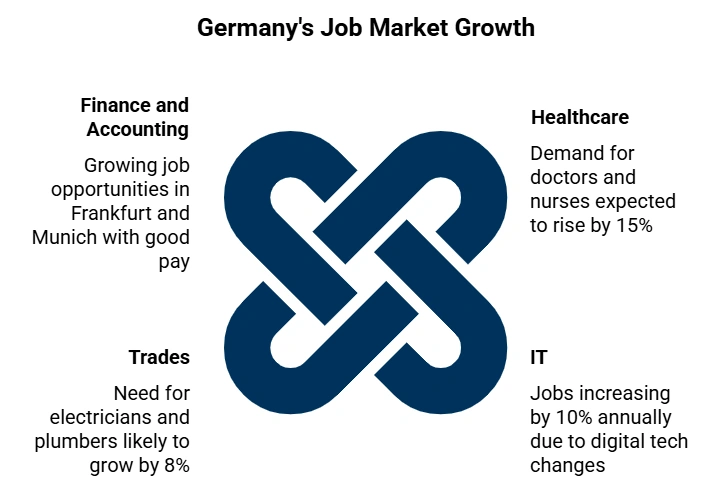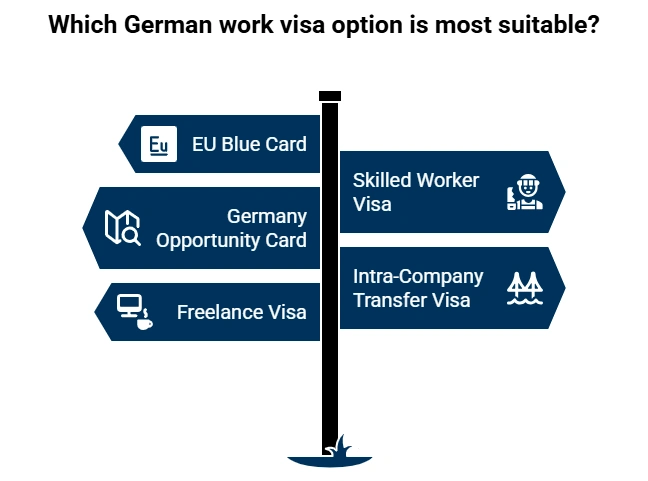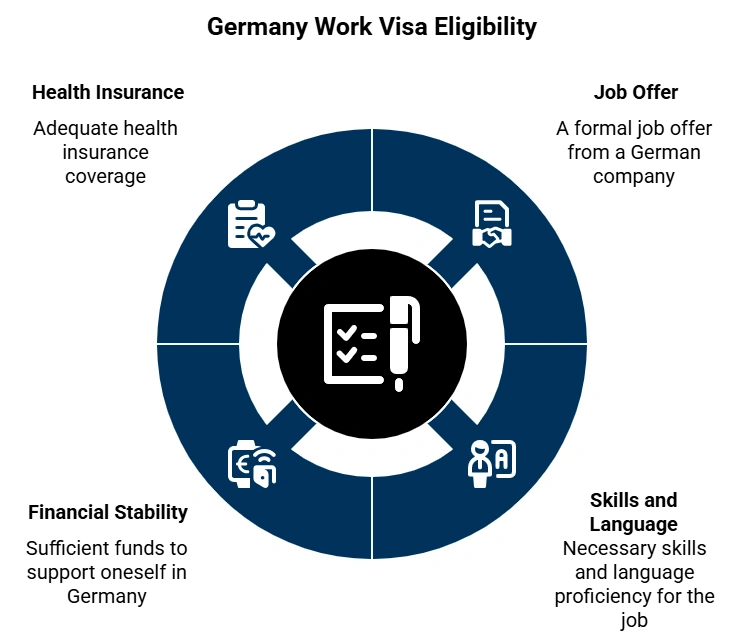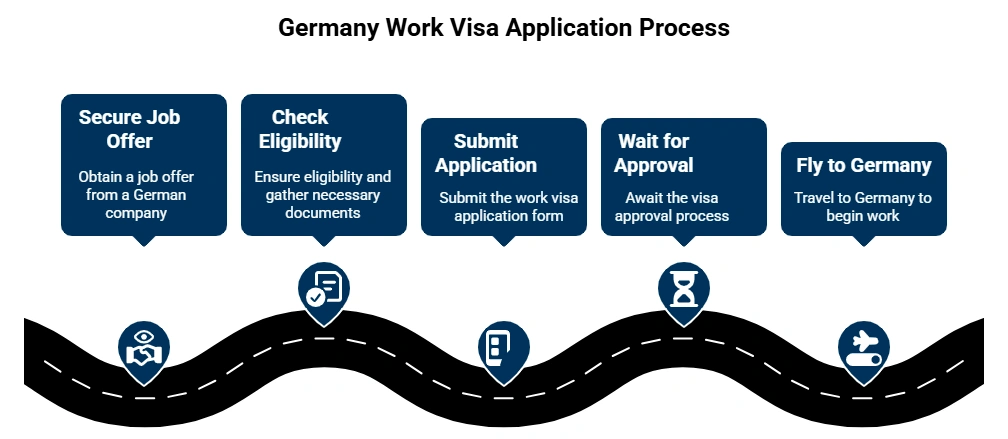Top In-Demand Occupations in Germany for UK Professionals
Germany's job market is vibrant, and there's a need for skilled people, especially in healthcare, IT, engineering, and skilled trades. Its strong economy, good work-life balance, and solid social benefits make Germany a great place for UK professionals looking for work.
- Germany is expected to add 1.2 million jobs by 2026.
- The healthcare field needs doctors and nurses, with demand likely to increase by 15%.
- IT jobs should increase by 10% each year because of changes in digital tech.
- Trades like electricians and plumbers will probably see an 8% increase in need as more construction happens.
- Finance and accounting jobs are still growing in Frankfurt and Munich, with good pay.

*Want guidance to apply for work overseas? Let Y-Axis guide you with the process.
Why Work in Germany?
Germany is a fantastic place for professionals, due to its strong economy, competitive salaries, and good benefits. The country’s reputation for solid industries, tech, and good schools make it a stable place to grow your career and build a life. The work culture is diverse, providing some good opportunities for those coming from other countries.
- You will find competitive salaries and multiple job opportunities in fields like tech, engineering, and healthcare.
- There is a focus on work-life balance, including paid time off.
- You will have access to good healthcare, schools, and social security.
- There are paths to permanent residency for skilled workers.
- The workplace is multicultural. Plus, you'll see modern infrastructure.
What are the Top In-Demand Occupations in Germany
Germany requires skilled people in diverse sectors. IT jobs like software developers, data scientists, and cybersecurity experts are open. There are also a lot of openings for healthcare workers like nurses and doctors. Engineering roles, mostly in mechanical, electrical, and civil fields, are needed, plus skilled trades like electricians, plumbers, and mechanics. Teachers, educators, and people in logistics and supply chain management are in demand, too.
Healthcare Sector
Germany's healthcare industry keeps expanding because the population is getting older and medicine is improving. They always need more doctors, nurses, and pharmacists.
|
Job Role |
Average Annual Salary (EUR) |
|
Specialist Doctor |
€70,000 – €150,000 |
|
General Practitioner |
€50,000 – €80,000 |
|
Registered Nurse |
€35,000 – €55,000 |
|
Pharmacist |
€40,000 – €70,000 |
|
Physiotherapist |
€35,000 – €55,000 |
|
Medical Laboratory Technician |
€30,000 – €50,000 |
|
Radiologist |
€80,000 – €150,000 |
|
Healthcare Manager |
€60,000 – €90,000 |
|
Occupational Therapist |
€40,000 – €60,000 |
|
Aged Care Worker |
€25,000 – €40,000 |
Information Technology (IT)
Germany's IT field is growing fast, and there are many openings for software developers, data scientists, and cybersecurity professionals.
|
Job Role |
Average Annual Salary (EUR) |
|
Software Developer |
€50,000 – €85,000 |
|
Data Scientist |
€60,000 – €100,000 |
|
Cybersecurity Specialist |
€55,000 – €95,000 |
|
Cloud Engineer |
€60,000 – €110,000 |
|
AI Engineer |
€70,000 – €120,000 |
|
IT Project Manager |
€65,000 – €95,000 |
|
Network Engineer |
€50,000 – €75,000 |
|
Business Intelligence Analyst |
€55,000 – €85,000 |
|
UX/UI Designer |
€45,000 – €70,000 |
|
DevOps Engineer |
€55,000 – €85,000 |
Engineering
Engineering jobs in Germany are in high demand, especially in the car, renewable energy, and building industries.
|
Job Role |
Average Annual Salary (EUR) |
|
Civil Engineer |
€50,000 – €85,000 |
|
Mechanical Engineer |
€55,000 – €90,000 |
|
Electrical Engineer |
€60,000 – €100,000 |
|
Project Manager (Construction) |
€70,000 – €120,000 |
|
Architect |
€50,000 – €80,000 |
|
Structural Engineer |
€55,000 – €90,000 |
|
Quantity Surveyor |
€45,000 – €70,000 |
|
HVAC Engineer |
€50,000 – €75,000 |
|
Building Services Engineer |
€55,000 – €85,000 |
|
Construction Manager |
€80,000 – €120,000 |
Skilled Trades
Germany has a high demand for skilled workers in construction, plumbing, and electrical jobs.
|
Job Role |
Average Annual Salary (EUR) |
|
Electrician |
€35,000 – €60,000 |
|
Plumber |
€30,000 – €55,000 |
|
Welder |
€30,000 – €55,000 |
|
HVAC Technician |
€35,000 – €60,000 |
|
Mechanic |
€30,000 – €50,000 |
|
Carpenter |
€35,000 – €55,000 |
|
Heavy Equipment Operator |
€40,000 – €60,000 |
|
Construction Laborer |
€30,000 – €45,000 |
|
Painter |
€30,000 – €45,000 |
|
CNC Machine Operator |
€40,000 – €60,000 |
Finance and Accounting
Germany's finance sector is doing well, with a lot of open positions in accounting, investment banking, and financial analysis.
|
Job Role |
Average Annual Salary (EUR) |
|
Financial Analyst |
€45,000 – €70,000 |
|
Chartered Accountant |
€55,000 – €85,000 |
|
Investment Banker |
€70,000 – €120,000 |
|
Tax Consultant |
€50,000 – €80,000 |
|
Auditor |
€45,000 – €70,000 |
|
Risk Manager |
€65,000 – €100,000 |
|
Financial Planner |
€50,000 – €75,000 |
|
Credit Analyst |
€40,000 – €65,000 |
|
Chief Financial Officer (CFO) |
€100,000 – €200,000 |
|
Treasury Manager |
€65,000 – €95,000 |
Education and Teaching
Germany presents openings for education pros, particularly those in science, tech, engineering, math, ESL, and trade skills training.
|
Job Role |
Average Annual Salary (EUR) |
|
Primary School Teacher |
€40,000 – €60,000 |
|
Secondary School Teacher |
€45,000 – €70,000 |
|
ESL Teacher |
€35,000 – €55,000 |
|
University Lecturer |
€60,000 – €100,000 |
|
Academic Advisor |
€45,000 – €70,000 |
|
Vocational Trainer |
€50,000 – €80,000 |
|
Special Education Teacher |
€40,000 – €60,000 |
|
School Administrator |
€55,000 – €80,000 |
|
Curriculum Designer |
€50,000 – €75,000 |
|
Teaching Assistant |
€25,000 – €40,000 |
Bottleneck Professions in Germany
Germany continues to experience significant labour shortages across critical sectors. According to the Federal Employment Agency (BA), there are 163 officially identified bottleneck occupations, accounting for nearly 50% of all job vacancies in the country.
Key Sectors with Bottleneck Occupations:
- Healthcare – Nurses, doctors, elderly care workers
- Engineering – Mechanical, civil, and electrical engineers
- Construction – Site managers, plumbers, electricians
- Education – Early childhood educators, secondary teachers
- Logistics – Truck drivers, warehouse operators
- Skilled Trades – Welders, HVAC technicians, machine operators
Green & Economic Transition: Jobs of the Future in Germany
Germany’s shift to renewable energy and digital infrastructure is creating a wealth of career opportunities in key green sectors. As per the latest stats, approximately 4% of all job openings nationally are directly related to the energy transition double the share in 2019.
Key Employment & Talent Gaps
- Between 2022 and 2024, employment in the renewable energy sector grew to 387,000 workers, up from 309,000 in 2019.
- Germany still faces a deficit of 300,000–560,000 skilled workers in clean-energy roles by 2030, notably in solar, wind, hydrogen, and grid technologies.
- In electric grid construction and energy transitions, over 18,300 vacancies remained unfilled in 2024, highlighting structural shortages in high-skill green trades.
| Green Role | Sector Focus |
| Renewable Energy Engineers | Solar, Wind, Bioenergy systems |
| Battery Technology Experts | E-mobility, energy storage solutions |
| Green Hydrogen Technicians | Hydrogen production & fuel infrastructure |
| Sustainability Analysts | ESG compliance and green strategy |
| Smart Grid Planners | Digitised energy systems and grids |
Germany Work Visa Options for UK Professionals
The various Germany work visa options for UK Professionals are given below:
- EU Blue Card
- Skilled Worker Visa
- Germany Opportunity Card
- Intra-Company Transfer Visa
- Freelance Visa

EU Blue Card
The EU Blue Card in Germany is a residence permit created for skilled workers from outside the EU. It makes it easier to get a work visa and become a permanent resident. This card offers a quicker way to live and work in Germany compared to the usual work visa. Plus, there are some perks for your family too.
Skilled Worker Visa
The Germany Skilled Worker Visa, or National Visa for qualified professionals, is a permit that allows skilled workers from outside the EU to live and work in Germany. It is designed for people who have finished vocational training or have a degree and a job waiting for them in Germany. The Skilled Immigration Act (FEG) has simplified the process for skilled workers, including those with vocational training and experience, to move to Germany.
Germany Opportunity Card
The German Opportunity Card, or Chancenkarte, is a fresh visa plan to bring skilled people from outside the EU to Germany. It lets them come to Germany for up to a year to find a job, even if they don't have one lined up yet. While they look for work, they can do part-time jobs (up to 20 hours each week) or short trial jobs lasting no more than two weeks with each company.
Intra-Company Transfer Visa
The Germany Intra-Company Transfer (ICT) Visa, or ICT Card, is a permit that lets firms move managers, experts, or trainees to their German office for a limited time. They must be coming from a parent company, branch, or related business outside the EU. EU ICT rules control this visa type, which is for staff working in Germany for a specific duration.
Freelance Visa
The German Freelance Visa, also called the Freiberufler visa, lets people live and work in Germany as freelancers or self-employed workers in specific fields. It's made for certain professionals and requires proof that you can support yourself financially. You might also need specific permits for your job.
Eligibility Criteria for Germany Work Visas
The eligibility criteria for Germany Work Visas are given below:
- A job offer from a German company in a field where workers are needed.
- The right skills and language abilities for the job.
- Enough money to take care of yourself.
- Health insurance.

Required Documents for Germany Work Visa
The documents required to apply for Germany Work Visa are given below:
- A valid passport.
- A job offer letter.
- Documents that show your skills and certifications.
- Proof that you know the language.
- Health insurance details and proof you can support yourself financially.
- A completed visa application.
Germany Work Visa Application Process
The procedure to apply for Germany Work Visa is given below:
Step 1: Secure a job offer from a German company.
Step 2: Make sure you are eligible and collect all the required documents.
Step 3: Submit your Germany work visa application form.
Step 4: Wait for your visa to be approved.
Step 5: Fly to Germany and start working.

Germany Work Visa Processing Time
Detailed information about the processing time for Germany Work Visa is given below:
|
Visa Type |
Estimated Processing Time |
|
EU Blue Card |
2 to 4 months |
|
Skilled Worker Visa |
1 to 3 months |
|
Job Seeker Visa |
4 to 6 weeks |
|
Intra-Company Transfer Visa |
2 to 3 months |
|
Freelance Visa |
1 to 3 months |
Cost of Germany Work Visa
Detailed information about the application cost of Germany Work Visa is given below:
|
Visa Type |
Estimated Application Fee (EUR) |
|
EU Blue Card |
€ 140 |
|
Skilled Worker Visa |
€75 – €100 |
|
Job Seeker Visa |
€ 75 |
|
Intra-Company Transfer Visa |
€75 – €100 |
|
Freelance Visa |
€ 100 |
Benefits of Working in Germany
The benefits of working in Germany are given below:
- Competitive pay and full social security.
- Lots of vacation, sick days, and retirement plans.
- Health care and a good public health system.
- Opportunity to apply for Germany permanent residency.
- Healthy work-life balance and paid time off.
Step-by-Step: How to Apply for Jobs in Germany?
You can follow the below steps to apply for a job in Germany:
Step 1: Check if your profession is listed as a shortage occupation on the official portal.
Step 2: Get your degree or qualifications recognised (use the Anabin database).
Step 3: Search for job offers via Jobbörse, LinkedIn, or company portals.
Step 4: Apply for the EU Blue Card or Skilled Worker Visa.
Step 5: Submit required documents and attend biometric appointment.
Step 6: Arrive in Germany and register your address within 2 weeks.
Step 7: Start working and apply for long-term residence if eligible.
Tips for UK-Based Applicants
- Begin your visa application early, as it could take considerable time
- Customize your CV to fit German requirements.
- If the job needs you to talk with German teams, learn the German language.
- Get advice from a migration agent about visas and jobs.
- Explore the salary ranges and living costs in Germany.
How Can Y-Axis Help You?
Y-Axis offers expert immigration advice based on what you need and want. Our services include:
- Guidance for German Immigration
- German language lessons
- Help finding jobs in Germany
- Free eligibility checks
- Y-Path to help you plan your move to Germany
- Career advice
Looking for Inspiration
Explore what Global Citizens have to say about Y-Axis in shaping their future
Frequently Asked Questions
